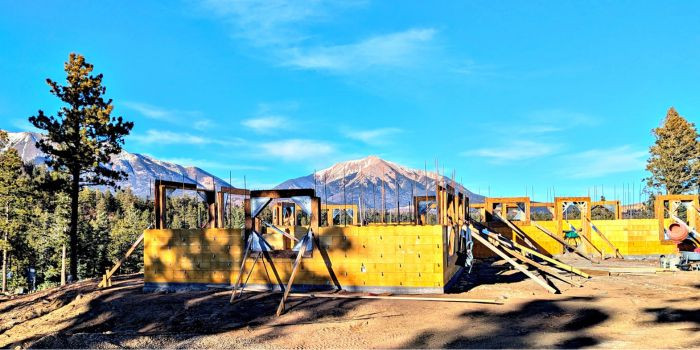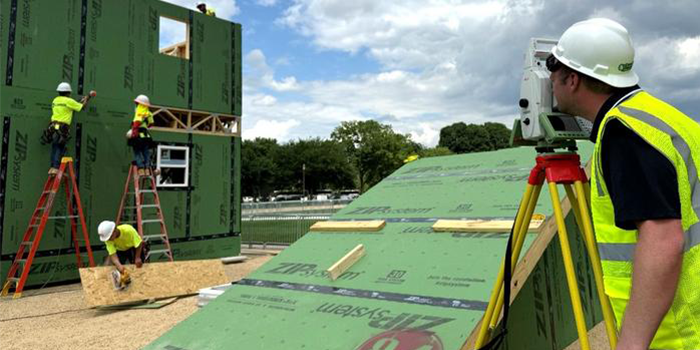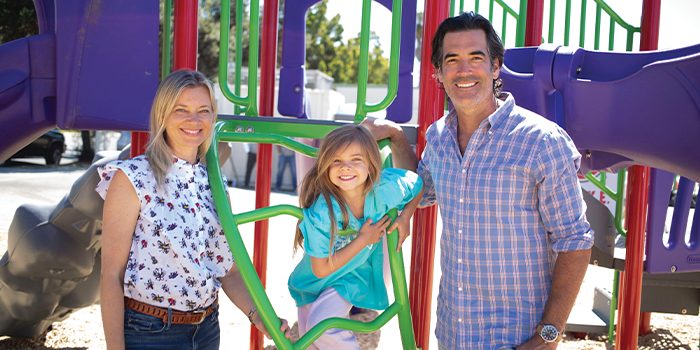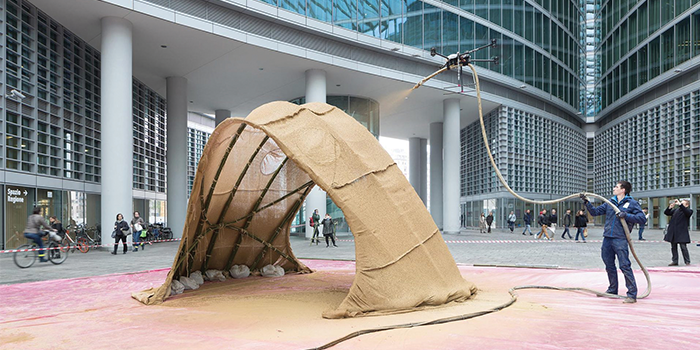A Family Retreat
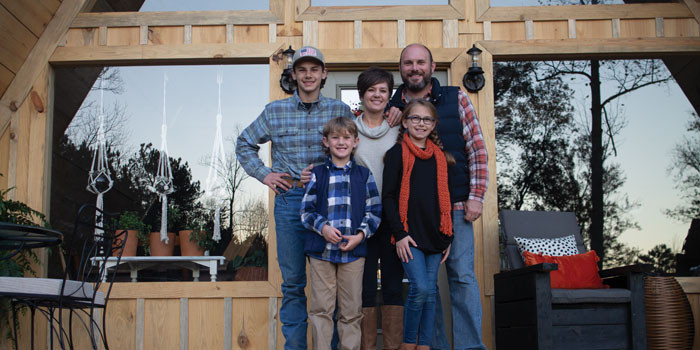

SPRAY FOAM MAGAZINE – Show Issue 2021 – According to the Off-Grid Solar report, 2020, the global off-grid sector has grown rapidly over the past decade and is now a $1.75 billion market annually, serving 420 million users with further growth predicted. How and where does spray foam insulation fit into this sector growth? Spray Foam Magazine went off-grid to see how SPF was helping one family live out their ‘cabin in the woods’ dream.
There are many reasons people choose to live or vacation off-grid. Some people like the feeling of being isolated, some believe in saving the environment and taking fuel poverty seriously, some don’t have a choice, and there are a number of people who would like to reduce their living cost. Whatever the reason, living off-grid has dramatically accelerated over the last few years and even off-grid communities are starting to repopulate rural areas.
In the foothills of the Appalachian Mountains, Northwest of Atlanta, Georgia, Mark and Greta Beckler built an off-grid, 850 sq. ft. A-frame cabin. Mark is a special education teacher at the local middle school and Greta is a pediatric physical therapist. They also have a portable toilet side business. Their three children are involved in sports and they all love to camp, hike, and enjoy the outdoors. The Beckler’s are very busy folk and this cabin will be used as a family retreat enabling them to get away from it all and live life off-grid when they can.
The cabin is located on 25 acres in Tunnel Hill, Georgia. The town was first named “Tunnelsville” in 1848 and later changed to Tunnel Hill. There are many interesting structures in the town dating back over one hundred years, and this cabin will add to that standard of thought-provoking builds. Mark and Greta, along with their three children, Jackson, 14, Lyla, 10 and Jeb, 6, chose an A-frame cabin because Mark enjoyed vacationing with his family in their A-frame cabin in Gatlinburg, Tennessee when he was a child. These happy childhood memories made it the perfect choice for this family when envisioning their dream of a cozy family retreat in the woods.
The DIY Network’s show, Building Off the Grid, reached out to Mark and Greta through mutual friends that knew about the Beckler’s vision for an off-grid cabin. The team from Dorsey Pictures, who produced this show, were often present during the build of the cabin, filming the build as it happened. When the film crew were not on site, they set up time lapse cameras to capture the work progression in real time.
Mark commented on the filming, “The TV show was a little out of our comfort zone in the beginning, but as it progressed we began to feel more comfortable. The film and production crew are great people that we have loved getting to know. We consider it a blessing to now call them friends.”
The A-frame has a rustic feel with galvanized metal for the roofing and the exterior walls. Large glass windows make up the majority of the west entrance of the home, providing the family with amazing views of the woods.
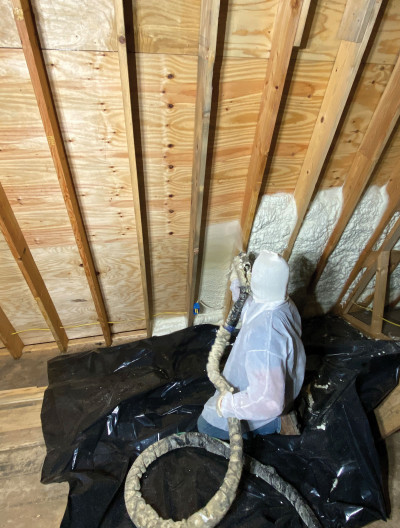
The architect of the build recommended open-cell spray foam insulation due to the exterior wall materials and angles of the build. The SPF was also specified to seal the building envelope which included 2 x 8 rafters at a pitch of 12/2. Hullender Services, LLC in Rocky Face, Georgia put on their air purifying respirators, safety goggles, and protective coveralls and came to spray the 1250 sq. ft of living space and applied the foam in the walls and the roof of the A-frame. The biggest safety consideration for the crew was the height of the ceilings and at the 22-ft peak of the roof, they used scaffolding with wallboards to access the spray area safely.
Prior to spraying, the surface was blown clean of all debris using an air hose. The floors and windows were covered with plastic, and the support beams were also covered to prevent SPF overspray from affecting those surfaces. Using a Graco E-30 proportioner, the crew applied Johns Manville Corbond open-cell foam. This is a lower density foam which delivers a high yield, eradicating air leakage by filling in gaps and cracks while creating an air seal. It also helps reduce sound transmission.
The metal walls are good thermal conductors of heat and cold, so the Beckler’s knew that they needed an efficient form of insulation to keep the cabin warm in the winter and cooler in heat of a North Georgia summer. The Beckler’s were happy that spray foam insulation was to be installed because over time as the house expands and contracts, so will the spray foam.
Due to the dynamics of the roofing, it was also important to fill all the spaces, preventing air from escaping or coming into the home. The metal roof acts as a thermal conductor requiring SPF to eliminate sweating of the roof and proper insulation to the 2 x 8 rafters. The two-man crew sprayed directly onto half-inch plywood at approximately eight inches of spray foam in each bay, using six to seven sets. The spray foam was then covered by 1 x 12 wooden boards, which was used as the ceiling and covered all exposed spray foam.
The actual duration of the job lasted five hours, but due to the remote location, getting materials to the site, bad weather and only generator power accessibility, it took the crew longer to complete the job.
The cabin’s primary use of heating and cooling will be a wood stove and ceiling fans, along with a floor unit air conditioner which is operated by solar power for cooling the home. It was therefore essential that the insulation used be efficient. Mark accentuates “It was amazing, immediately after adding the spray foam the cabin retained heat during the cool nights while we worked, and the next day when the sun was so hot, the A-frame was nice and cool on the inside,” Mark went on to say, “We are very glad we chose to build off the grid! This build gave us the opportunity to do something new as a family. It now provides a place for us to go and leave behind technology and other distractions, and spend time talking, playing games, and reconnecting.”
As the off-grid sector develops and solutions like solar water pumps, cold storage and SPF insulation become areas of expansion, then so will the demand to have these solutions in more remote locations. Hullender Services not only managed to work in one of these remote locations, but also accomplished exactly what this customer desired, a fully insulated off-grid structure that will remain cool in the summer and warm in the winter.
Disqus website name not provided.



